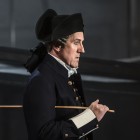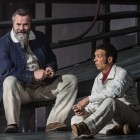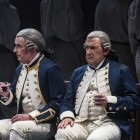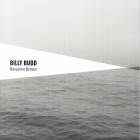Billy Budd 2016Opera North
Read more about the opera Billy Budd
For their Edinburgh visit in autumn 2016, Opera North promised two programmes of twentieth century masterworks - a double-bill of Puccini (Il tabarro and Suor Angelica) alternating with Britten's Billy Budd.
None of these fine works has ever been seen at the Edinburgh Festival. While Scottish Opera staged the Britten most memorably a quarter century ago (as a co-production with Opera North), they have never presented the Puccini. Indeed, apart from a single performance by ETO of Il tabarro at the Perth Festival, we need to look back to the 1950s for professional stagings of these short tragedies in Scotland.
Billy Budd is one of those rare pieces that opera companies tend to avoid unless they know they have a superbly disciplined chorus and orchestra and have also assembled a cast of principals with the appropriate talents. This team looked distinctly promising, with three key performers returning north after some time away.
Roderick Williams worked often with Scottish Opera at the start of his career and is a sensitive singing actor. Tenor Alan Oke also began by spending many seasons working in Scotland, and made a brief return to the Usher Hall at last year's Festival. Some operagoers will perhaps remember Oke's recent televised performances of the title role in Peter Grimes on the beach at Aldeburgh. Bass Alastair Miles has done no opera in Scotland for twenty years - singing all over the world meantime. Even when he visited the Festival for major appearances, it was always in concert performances. But Claggart was a good acting role for him to get his teeth into at last.
Conductor Garry Walker is a Scot who is also now more familiar in other countries, so it was good to hear him conduct this shatteringly powerful score. Indeed that is where comment on this final performance of the tour has to start. From the opening bars it was clear that Walker had a tight grip on the piece that never relaxed, and led to some brilliant music-making. The superb orchestra was backed up every step of the way by the chorus of Opera North, clearly much augmented, and including some names perhaps more familiar north of the border than in Leeds. The huge set piece at the start of the second act as the ship is cleared for action and the preceding boredom is dispelled came across with hair-raising power.
Of the principals, Alan Oke's performance as Vere rightly made him the linch-pin of the evening. Every note told in a performance that was also acted with subtlety. If there were ever worries that Roderick Williams might have been too old to be tackling the title-role, these were quickly dispelled. Perhaps his acting was slightly too bouncy to start with, but he settled, and his singing was always near the ideal - the final Billy in the 'darbies' solo being especially fine.
The Claggart of Alastair Miles was presented as a smooth and controlled villain. Perhaps he didn't quite project the required sense of evil - while the officers were rightly oblivious of his effect on the men, the crew's fear of him didn't really come across. Vocally he was generally fine - his big solo 'credo' in which he promises to destroy Billy was particularly effective. However on Saturday, at least, he struggled with his first highlight - 'Let him crawl!' did not quite plumb the depths of black tone.
Several other portrayals stood out, particularly the Novice of Oliver Johnston, supported by Gavan Ring as his Friend. Stephen Richardson's Dansker also seemed more important than usual. Of the officers, Peter Savidge made an incisive Redburn, and the bafflement that he, Ratcliffe and Flint all felt at the drumhead trial imposed on them by Vere was well projected.
It is perhaps unfair to leave comment on the production to the end, but the combined work of Orpha Phelan and Leslie Travers was so good that it is difficult to pick out highlights. There was a complete sense of integrity about the enterprise, as though the crew all knew one another of old. Simple details were generally spot-on - such as the costumes looking both ill-fitting and old. They contrasted with the more sharply-attired Marines' uniforms. The atmospheric set also looked old, with timbers bleached by age, and hardly a straight line to be seen - even the decks were curved.
Altogether this was a worthy account of what increasingly comes to look like the greatest British opera of the twentieth century.
Performance Cast
- Edward Fairfax Vere Captain of H M S Indomitable
- First Mate
- Second Mate
- Mr Flint Sailing Master
- Bosun
- Donald a sailor
- Maintop
- Novice
- Squeak ship's corporal
- Mr Redburn First Lieutenant
- Mr Ratcliffe Second Lieutenant
- John Claggart Master-at-Arms
- Red Whiskers an impressed man
- Arthur Jones an impressed man
- Billy Budd able seaman
- Novice's Friend
- Dansker an old seaman













